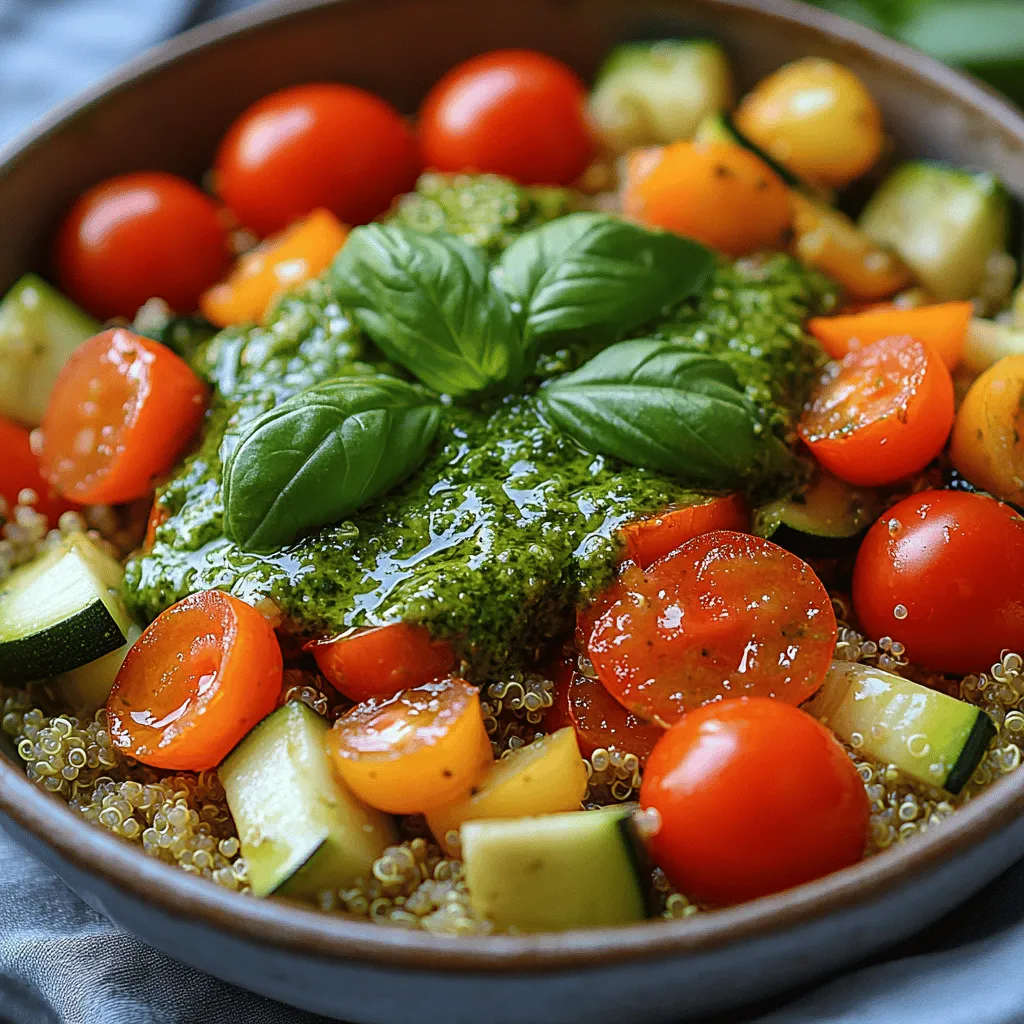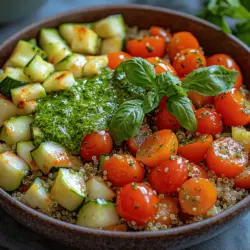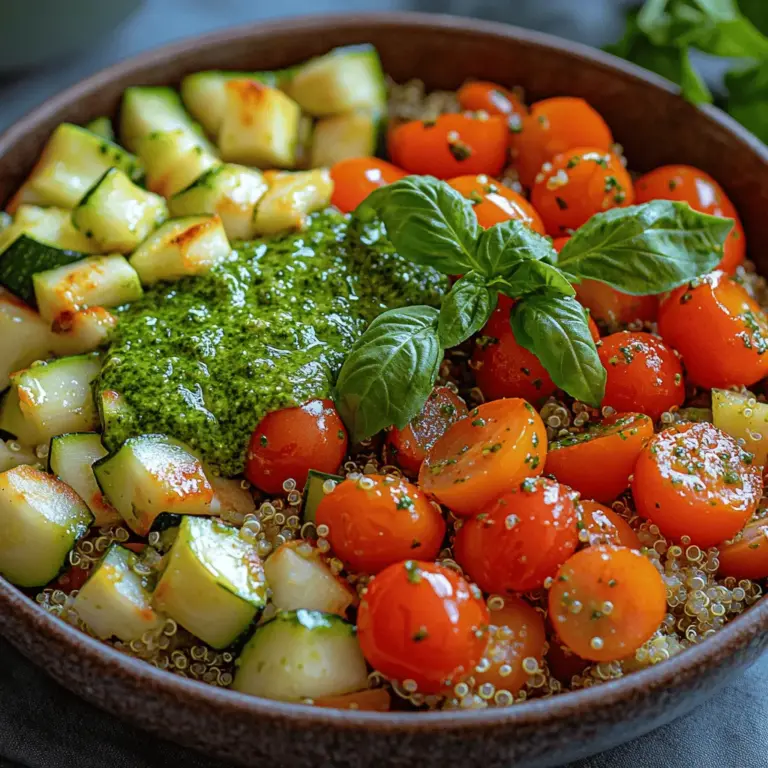Introduction
The Bright Basil Pesto Quinoa Salad is more than just a dish; it’s a vibrant reflection of the rich culinary traditions that blend freshness and health. Originating from the Mediterranean, pesto has long been celebrated for its aromatic blend of basil, garlic, and nuts, typically paired with pasta. However, this salad takes the classic concept of pesto and reimagines it through the lens of health-conscious cuisine, making it a perfect choice for those seeking nutritious yet delicious meal options.
The significance of this dish goes beyond its flavor; it highlights the versatility of quinoa, a pseudo-grain that has garnered global attention for its protein content and health benefits. This salad is not only a staple in vegetarian and vegan diets but also appeals to anyone looking to incorporate more plant-based meals into their routine. In this article, readers will discover the origins and cultural relevance of the Bright Basil Pesto Quinoa Salad, explore its nutritional advantages, and learn how to prepare this delightful dish step-by-step.
Understanding the Dish
Description of the Dish and Its Key Ingredients
Bright Basil Pesto Quinoa Salad is a refreshing blend of cooked quinoa tossed with a homemade basil pesto, fresh vegetables, and optional toppings such as nuts or cheese. The dish is characterized by its vibrant green color, courtesy of the basil pesto, which serves as both a dressing and flavor enhancer. The key ingredients include:
– Quinoa: A nutrient-dense seed that cooks up fluffy and provides a complete protein source.
– Fresh Basil: The star of the pesto, offering aromatic flavor and numerous health benefits.
– Garlic: Adds depth and a slight kick to the pesto, enhancing the overall taste.
– Pine Nuts (or alternatives): Contribute creaminess to the pesto while adding healthy fats.
– Lemon Juice: Brightens up the dish and balances the flavors.
– Seasonal Vegetables: Such as cherry tomatoes, bell peppers, or cucumbers, which add texture and freshness.
Cultural Background and Variations Across Regions
Pesto finds its roots in Genoa, Italy, where the traditional sauce is made by grinding fresh basil leaves, pine nuts, garlic, Parmesan cheese, and olive oil. While the classic preparation remains beloved, variations of pesto have emerged worldwide, including sun-dried tomato pesto, arugula pesto, and even kale pesto. The inclusion of quinoa in this recipe reflects the growing trend of integrating ancient grains into modern diets, especially in health-conscious communities.
Different regions have adapted the concept of pesto and salads to their local palates. For instance, in South America, you might find variations that incorporate local herbs and nuts, while in Asian countries, sesame oil or soy sauce could replace olive oil, creating a fusion of flavors. The Bright Basil Pesto Quinoa Salad is a celebration of these cross-cultural influences, marrying Italian heritage with contemporary dietary needs.
Nutritional Benefits of the Main Ingredients
The nutritional profile of the Bright Basil Pesto Quinoa Salad is impressive. Quinoa is gluten-free and provides all nine essential amino acids, making it a complete protein source ideal for vegetarians and vegans. It’s also high in fiber, magnesium, and antioxidants.
Basil, the cornerstone of the pesto, is rich in vitamins A, C, and K, along with essential oils that offer anti-inflammatory properties. Garlic, known for its immune-boosting benefits, contains allicin, which has been shown to have various health benefits, including lowering blood pressure and cholesterol levels.
Pine nuts, while calorie-dense, provide healthy fats, vitamins, and minerals. They are also rich in magnesium, which plays a crucial role in muscle and nerve function.
Overall, this salad is not just a feast for the eyes but also a powerhouse of nutrition, supporting heart health, digestive health, and overall well-being.
Ingredients Overview
List of Primary Ingredients
For the Bright Basil Pesto Quinoa Salad, you will need the following ingredients:
1. Quinoa (1 cup)
2. Fresh basil leaves (2 cups)
3. Garlic cloves (2-3, depending on taste)
4. Pine nuts (1/4 cup, or substitute with walnuts or sunflower seeds)
5. Extra virgin olive oil (1/3 cup)
6. Lemon juice (from 1 lemon)
7. Salt and pepper (to taste)
8. Cherry tomatoes (1 cup, halved)
9. Cucumber (1 medium, diced)
10. Bell pepper (1 medium, diced)
11. Grated Parmesan cheese (optional, for non-vegans)
Detailed Information About Each Ingredient and Its Role in the Recipe
– Quinoa: The base of the salad, quinoa provides a nutty flavor and a chewy texture, making it a satisfying addition. When cooked properly, it fluffs up beautifully, creating a perfect canvas for the vibrant pesto and fresh vegetables.
– Fresh Basil Leaves: The main ingredient in the pesto, fresh basil brings a fragrant and slightly sweet flavor, which is essential for the salad’s overall taste profile.
– Garlic Cloves: Garlic not only adds a punch of flavor but also serves as an antioxidant. It complements the basil in the pesto and enhances the overall taste of the salad.
– Pine Nuts: These nuts add creaminess to the pesto, providing a rich flavor that balances the freshness of the basil. They can be toasted for an added depth of flavor.
– Extra Virgin Olive Oil: This high-quality oil is essential for emulsifying the pesto, providing richness and healthy fats that help absorb the fat-soluble vitamins in the salad.
– Lemon Juice: Freshly squeezed lemon juice adds acidity, brightening the flavors and balancing the richness of the pesto.
– Salt and Pepper: These basic seasonings enhance all the flavors in the dish, ensuring that each ingredient shines.
– Cherry Tomatoes, Cucumber, and Bell Pepper: Fresh vegetables add crunch, color, and nutritional benefits, making the salad more visually appealing and wholesome.
– Grated Parmesan Cheese: While optional, this cheese adds a savory umami flavor that complements the pesto, particularly if you are not adhering to a strict vegan diet.
Alternatives for Common Ingredients
If you’re looking for alternatives or substitutions, consider the following:
– Quinoa: You can replace quinoa with farro, bulgur, or even brown rice for a different flavor and texture.
– Pine Nuts: Walnuts, almonds, or sunflower seeds can be used in place of pine nuts, especially if allergies are a concern.
– Parmesan Cheese: Nutritional yeast is a great vegan substitute, providing a cheesy flavor without dairy.
– Vegetables: Feel free to swap in seasonal vegetables like zucchini, asparagus, or even leafy greens like spinach or arugula based on availability.
Seasonality and Sourcing Tips
To achieve the freshest flavors, sourcing seasonal ingredients is key. Fresh basil is best in late spring and summer, while quinoa can be found year-round in most grocery stores. When selecting vegetables, look for vibrant colors and firm textures, which indicate freshness.
Farmers’ markets are excellent places to find organic and locally sourced produce, ensuring that you support local agriculture while enjoying the best flavors of the season. If you’re growing your own herbs or vegetables, you can enjoy the full garden-fresh experience, making the salad even more delightful.
Preparation Steps
Step-by-Step Guide to Preparing the Dish
Preparing the Bright Basil Pesto Quinoa Salad involves several steps, each crucial to ensuring that the final dish is flavorful and appealing:
1. Cook the Quinoa: Rinse 1 cup of quinoa under cold water to remove any bitterness. In a medium saucepan, combine the rinsed quinoa with 2 cups of water. Bring to a boil, then reduce the heat to low and cover. Let it simmer for about 15 minutes or until the quinoa is fluffy and the water is completely absorbed. Remove from heat and let it rest covered for an additional 5 minutes before fluffing it with a fork.
2. Make the Basil Pesto: While the quinoa is cooking, prepare the pesto. In a food processor, combine 2 cups of fresh basil leaves, 2-3 garlic cloves, and 1/4 cup of pine nuts. Pulse until coarsely chopped. With the processor running, slowly drizzle in 1/3 cup of extra virgin olive oil until the mixture is well blended. Add the juice of one lemon, salt, and pepper to taste, and pulse again until smooth.
3. Prepare the Vegetables: Wash and chop your vegetables. Halve the cherry tomatoes, dice the cucumber, and bell pepper. Set aside.
4. Combine Ingredients: In a large mixing bowl, combine the cooked quinoa, pesto, and chopped vegetables. Gently fold everything together until the quinoa is well coated in the pesto and the vegetables are evenly distributed.
5. Taste and Adjust: Before serving, taste the salad and adjust the seasoning as needed, adding more salt, pepper, or lemon juice to suit your preferences.
Importance of Proper Preparation Techniques
Proper preparation techniques are vital for maximizing flavor and ensuring a pleasant texture in the Bright Basil Pesto Quinoa Salad. Rinsing quinoa before cooking helps eliminate any bitterness, while allowing it to rest after cooking results in a fluffier final product. When making pesto, pulsing the ingredients rather than blending them creates a more textured sauce, which can enhance the overall mouthfeel of the salad.
Common Mistakes to Avoid During Preparation
– Overcooking Quinoa: This can lead to a mushy texture. Keep an eye on the cooking time and ensure that the quinoa is fluffy and each grain is separate.
– Not Tasting the Pesto: Always taste and adjust your pesto before mixing it into the salad. The balance of flavors is crucial to achieving a well-rounded dish.
– Skipping the Resting Time: Letting the cooked quinoa rest covered allows it to steam and become fluffy. Skipping this step can result in a denser texture.
Cooking Techniques
Overview of the Cooking Methods Involved
The Bright Basil Pesto Quinoa Salad primarily involves two cooking techniques: boiling and food processing. Understanding these methods will help you achieve the best results.
1. Boiling: This method is used to cook quinoa. Proper boiling ensures that the quinoa cooks evenly and absorbs the right amount of water, resulting in a light and fluffy texture.
2. Food Processing: This technique is employed to create the pesto. A food processor allows for quick blending of the basil, nuts, garlic, and oil, creating a smooth paste that infuses the salad with flavor.
Detailed Instructions for Each Cooking Technique Used
– Boiling Quinoa:
– Rinse 1 cup of quinoa in a fine-mesh strainer under cold running water to remove saponins, which can give it a bitter taste.
– Combine the rinsed quinoa with 2 cups of water in a saucepan and bring to a boil over medium-high heat.
– Once boiling, reduce the heat to low, cover, and simmer for 15 minutes or until the quinoa has absorbed all the water.
– After 15 minutes, remove the saucepan from heat and let it sit, covered, for another 5 minutes. Fluff the quinoa with a fork before using.
– Making Pesto in a Food Processor:
– In a food processor, combine 2 cups of fresh basil, 2-3 minced garlic cloves, and 1/4 cup of pine nuts (or your chosen substitute).
– Pulse these ingredients until they are coarsely chopped.
– With the processor running, slowly pour in 1/3 cup of extra virgin olive oil until the mixture is blended into a smooth paste.
– Add the juice of one lemon and season with salt and pepper to taste. Pulse again to mix.
With these steps covered, readers are now well-equipped to embark on their culinary journey to create the Bright Basil Pesto Quinoa Salad. In the next section, we will delve deeper into specific tips for achieving the best results and answer common questions about this delightful dish.

Tips for Achieving the Best Results with Each Method
Creating the perfect Bright Basil Pesto Quinoa Salad requires some thoughtful techniques to ensure every bite bursts with flavor. Whether you’re preparing the salad for a family meal, a potluck, or meal prep for the week, here are some tips to help you excel.
Flavor Enhancements
1. Spices and Herbs That Can Elevate the Dish: While the star of this dish is undoubtedly the basil pesto, consider adding a pinch of red pepper flakes for heat or smoked paprika for a subtle smokiness. Fresh herbs like parsley or cilantro can also complement the basil, adding layers of freshness.
2. Techniques for Layering Flavors: Start with a well-seasoned quinoa base. Before cooking the quinoa, sauté it in a little olive oil and garlic to infuse the grains with flavor. Additionally, taste your pesto before mixing it with the quinoa; if it needs brightness, add a squeeze of lemon juice or a dash of vinegar to enhance the overall profile.
3. Suggestions for Customizing the Flavor Profile: Make the salad your own by incorporating your favorite vegetables. Consider adding roasted bell peppers for sweetness, chopped sun-dried tomatoes for a tangy kick, or even olives for a briny touch. You can also experiment with nuts, replacing pine nuts with walnuts or almonds for a different texture and flavor.
Serving Suggestions
The presentation of your Bright Basil Pesto Quinoa Salad can impress your guests and elevate the dining experience. Here are some serving suggestions to consider:
1. Ideal Accompaniments for the Dish: This salad pairs beautifully with grilled chicken, shrimp, or a side of crusty bread. For a vegetarian option, consider serving it alongside a chickpea salad or stuffed bell peppers.
2. Presentation Tips for a Stunning Plate: To create an eye-catching presentation, serve the salad in a large, shallow bowl. Garnish with extra basil leaves, a sprinkle of feta cheese, or a handful of cherry tomatoes for color. Drizzle with balsamic reduction or olive oil just before serving for a polished look.
3. Pairing Ideas with Beverages: A crisp white wine, such as Sauvignon Blanc or a light rosé, complements the fresh flavors of the salad. For a non-alcoholic option, a sparkling water with lemon or a refreshing iced herbal tea would be delightful.
Storage and Reheating
Proper storage and reheating are essential to maintain the quality of your Bright Basil Pesto Quinoa Salad. Here’s how to ensure your leftovers stay fresh:
1. Proper Storage Techniques for Leftovers: Store any leftover salad in an airtight container in the refrigerator. If you anticipate having leftovers, consider storing the pesto separately from the quinoa and vegetables to prevent sogginess.
2. Best Practices for Reheating the Dish Without Losing Quality: While this salad is delicious cold, if you prefer to serve it warm, gently reheat the quinoa in a skillet over low heat, adding a splash of water to prevent it from drying out. Avoid microwaving the salad as it can make the vegetables mushy.
3. How Long the Dish Can Be Stored Safely: The salad can be stored safely in the refrigerator for up to three days. However, for the best flavor and texture, aim to consume it within two days.
Culinary Variations
The Bright Basil Pesto Quinoa Salad is versatile and can be adapted in numerous ways, reflecting various culinary traditions and dietary needs.
1. Popular Variations of the Dish from Different Cultures: In Mediterranean cuisine, consider adding roasted eggplant and chickpeas to the salad for a heartier version. In Mexican cuisine, swap the pesto for a cilantro-lime dressing and incorporate black beans, corn, and diced avocado.
2. Suggestions for Adapting the Recipe for Dietary Restrictions: This salad can easily cater to gluten-free and vegan diets. For those avoiding nuts, substitute the pesto with a sunflower seed spread or a creamy avocado dressing. Additionally, ensure the ingredients are certified gluten-free if needed.
3. Creative Twists on the Classic Recipe: For a delightful twist, try adding fruits such as diced mango or strawberries, which lend a sweet contrast to the savory pesto. Another idea is to incorporate grains like farro or barley for a different texture and additional nutrition.
Conclusion
The Bright Basil Pesto Quinoa Salad is not only a feast for the eyes but also a nutritious and tasty dish that showcases the vibrant flavors of fresh ingredients. Its versatility allows for endless customization, making it suitable for various occasions, from casual family dinners to elegant gatherings.
Creating this salad at home provides the opportunity to experiment with flavors and ingredients, allowing you to tailor it to your preferences. Whether you enjoy it as a main dish or a side, you’ll appreciate the balance of flavors and the health benefits of quinoa and fresh vegetables.
As you embark on your cooking journey, remember that the joy of making this salad lies not just in the final product, but in the process itself. Gather your ingredients, get creative, and savor each step—because good food brings people together, and there’s nothing quite like sharing a delicious meal with loved ones. Enjoy the adventure of cooking and the delightful taste of your Bright Basil Pesto Quinoa Salad!


